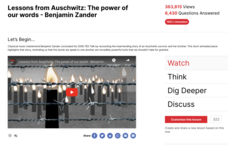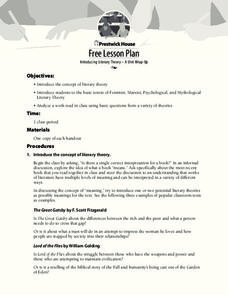American Psychological Association
Statistical Significance
Our survey says ...! High school psychology scholars analyze how people create surveys. Three different scenarios help them discover the meaning behind statistical significance. Armed with new knowledge, novice psychologists uncover what...
Texas Education Agency (TEA)
Health and Wellness Throughout the Lifespan
Every stage of life has its requirements for staying healthy. Young developmental psychologists investigate the psychological effects of stress and aging and health and wellness strategies that may improve one's quality of life. Groups...
American Psychological Association
Counting Fidgets: Teaching the Complexity of Naturalistic Observation
Why do psychologists conduct experiments in controlled laboratory settings? High schoolers gain an understanding of the importance of controls with an activity that involves naturalistic observations with no imposed controls.
American Psychological Association
Research Ethics
Psychologists designing experiments to research human behavior must consider weighty ethical concerns. Class members act as members of an institutional review board and examine proposals to determine whether included provisions...
Global Oneness Project
Our Shared Humanity
Ann Shin's award-winning documentary, My Enemy, My Brother introduces viewers to Zahed Haftlang and Najah Aboud, two child soldiers on opposite sides during the Iran-Iraq war. After viewing the film, class members are asked to...
TED-Ed
Lessons from Auschwitz: The Power of Our Words
Some words are best left unspoken. Words matter, according to Benjamin Zander, conductor, teacher, and lecturer. To illustrate his point, Zander recounts a story told to him by a survivor of Auschwitz. As a result of her experience...
Prestwick House
Introducing Literary Theory – A Unit Wrap-Up
Literary theories are lenses through which a text may be analyzed. The question in this lesson plan is how a particular literary lens can influence the reader's view of the text.
PBS
Stories of Painkiller Addiction: Contemplating Nature vs. Nurture
Does having an addict in your family make it more likely to become one yourself? Explore the genetic risk factors, as well as the prominent environmental influences, for substance addiction in a lesson that encourages awareness and open...
Other popular searches
- Obedience Social Psychology
- Social Psychology Attitude
- Discuss Social Psychology
- Social Psychology Powerpoint
- Prejudice Social Psychology
- What Is Social Psychology
- Social Psychology Aggression
- Social Psychology Influences
- Altruism Social Psychology
- Social Psychology Love
- Altruism + Social Psychology
- Social Psychology Law







